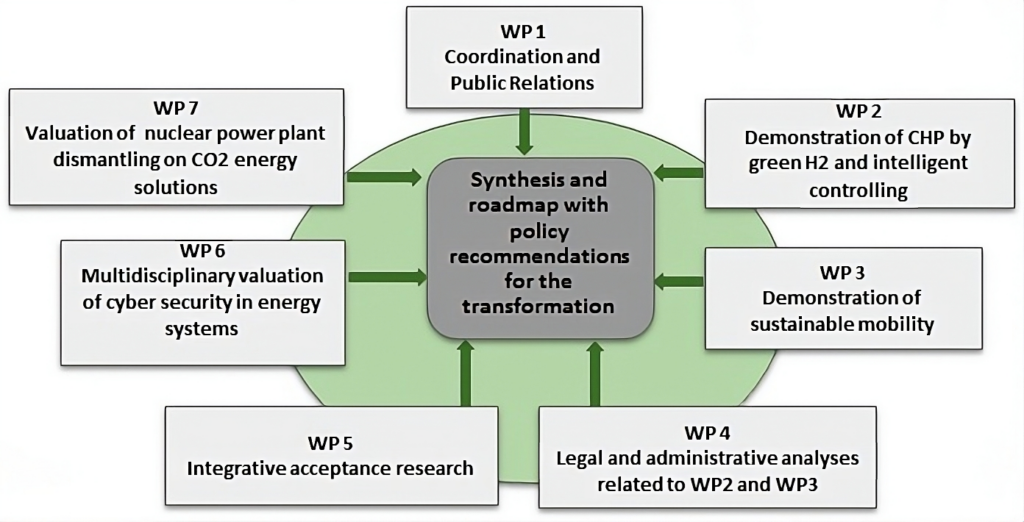The project is divided into seven work packages (WPs) aiming to analyse the impact and use cases of innovative technologies on the Upper Rhine Region.

WP1 enocmpasses organisation and coordinating the efforts in the projects. Securing knowledge and ensuring communication among the partners and external stakeholders. Involvement of potential users in the development of technologies shall make them more accessible and tailored to the users’ needs, so that technology pickup cna be accelerated. Joint tasks are being centrally coordinated and overlap among the WPs means that exchange among them is key to success.
WP2 is the central research package wherein an innovative combined heat and power plant (CHP) running on hydrogen and, for an intermeidate period, on a gas and hydrogen mix is developped and tested in a laboratory setting. Headed by the HKA, this WP aims to employ a digital model to easily attain the feasibility of employing such a CHP on a larger scale across the Upper Rhine Region for potential users.
WP3 focusses on sustainable mobility and is being researched at the university of Freiburg. The research focusses on the use of electric moiblity as an extension of the CHP plant. The goals are to visualise and analyse the current infrastructure, such that future recommendations can be made for the expansion of emission-free mobility.
WP4 is led by HS-Kehl and comprises both a legal and administrative anaylsis of the new technologies that are being researched and developped. Given the different legal frameworks of the three countries that are part of the region, an extensive analysis and comparison of legal standards along the way is key. Two project partners involved in the project are located in Germany (city of Offenburg) and France (CeA), thus the focus rests on a franco-german comparison of the necessary steps to integrate the CHP, hydrogen and EV-mobility into both countries.
WP5, headed by the KIT-DFIU, focusses on acceptance research as regards the new technologies. Their ocntribution is in identifying needs and expectations of stakeholders. To make sure that the technologies make it to the users and can be employed effectively, their acceptance among both the public and administrations is necessary for technological innovations to succeed.
WP6 is being researched at the UHA and pertians to cyber-security of energy systems. Security of the grid is an important factor for energy systems anywhere and therefore the project also incorporates a security perspective to protect and work on energy grids. Decentralised energy systems and power delivery plays an increasingly important role in connecting users to providers.
WP7 deals with the prospect of dismantling and reusing materials from a disused nuclear power plant. Specifically, the Fessenheim plant, which has been shut down in 2020, harbors many useful materials that may be reclaimed. The WP analyses the condition in which such materials need to be for reuse and how their usage might impact the lifecycle impact. It serves to give a perspective on how the lifecycle of different scenarios may pan out and whether materials that were previously used for nuclear power might be useful in expanding a carbon neutral energy system.

